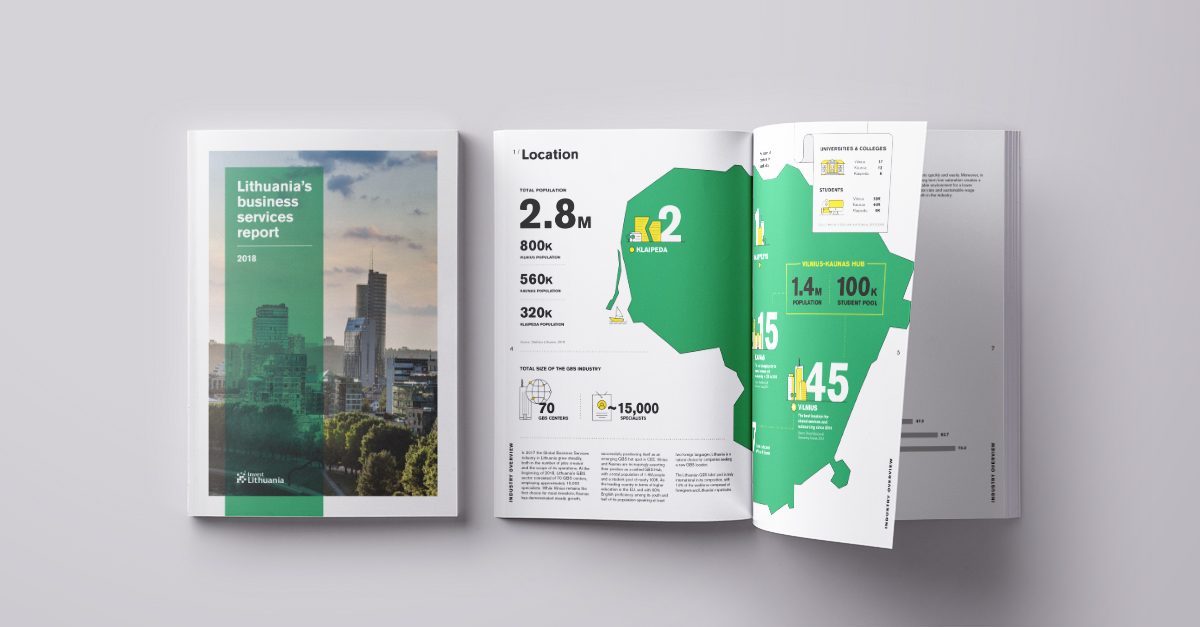Lithuania is expanding as a location for global companies in search of optimization opportunities, and international players acknowledge that cost arbitrage is no longer the main reason for expansion or relocation. Western and Nordic companies that have already chosen to set up in Lithuania admit that a “can-do” attitude and cultural proximity that define the quality of talent they find here are the main reasons behind Lithuania having come up on their corporate map.
According to Invest Lithuania, the country’s investment promotion agency, Lithuania’s Global Business Services (GBS) sector grew 17% last year and is now comprised of 70 centres employing 15,500 specialists. The annual, already 4th Lithuania’s Global Business Services Report shows that this Baltic nation – whose population of 2.8 million is both highly educated and driven – now boasts a mature GBS sector that adds value to the operations of global business across a wide range of functions.
A vibrant sector
What makes Lithuania stand out is diversity seen across multiple domains. Currently, 54% of the workforce is female, and more than a third of the general managers in the industry are women. The industry is also employing an increasing number of Lithuanian repatriates (now 10% of the workforce) and international talents (4% of the workforce).
Speaking of diversity, as much as 2.3% of the workforce is comprised of robots. This is due to the dramatic rise of award-winning Robotic Process Automation (RPA) processes within the sector. 67% of GBS centres deploy RPA, with 48% developing bespoke solutions in-house. On average, there are 31 robots operating in GBS centres in Lithuania, and Western Union’s Vilnius facility recently won the Top Robotics / RPA Implementation Award for the CEE region at both the USA – Europe Shared Services Awards 2018 and the CEE Shared Services and Outsourcing awards 2018.
Talents come first
The diversity in talent is matched by the variety of functions and tasks trusted to Lithuanian teams. 85% of Lithuanian GBS centres are multifunctional, with IT (29%), Customer Operations (25%) and F&A (17%) the most common. Other notable functions entrusted to Lithuanian teams include HR, Engineering, Legal Services, Anti-Money Laundering, Auditing and Robotics. Local divisions of such companies as Nasdaq, Danske Bank, WIX, Uber and Telia are developing core products for their respective parent companies from Vilnius.
According to OECD, Lithuania is ranked 1st in Europe (and 4th globally!) for the number of people with tertiary education. The country’s universities have strong positions in both STEM and Humanities, and multiple businesses are working hand-in-hand with universities to offer a wide range of opportunities to future specialists. These include sector-specific language courses, programming and AI labs, career counselling, not to mention internship opportunities across a range of cutting-edge fields.
A tale of two cities
Lithuania’s business service sector is centred around the Vilnius-Kaunas hub. Located just 1 hours’ drive apart and each boasting a well-connected international airport, these cities have a combined population of 1.4 million and a pool of over 100,000 students.
Vilnius has been named the region’s best location for Shared Services for the last 4 years running. It is a location that offers a well-developed GBS ecosystem and is firmly on the maps of major international investors. In 2017, the likes of Booking.com, Catalyst Development, Yara International and many more joined established players in the Lithuanian capital. This strong presence of top global brands means Vilnius’ GBS sector is characterised by quality, international expertise and multi-functionality.
Just 100km down the highway, lies Kaunas, a rapidly developing and dynamic GBS location. With 15 centres now established in Kaunas – including 2017 arrivals Centric, Hyarchis, TGW, NKT and many more – it might soon catch up with Vilnius. Besides, both cities boast a low saturation rate. At present, just 23 out every 1,000 inhabitants in Vilnius work in the sector, and the figure is even lower in Kaunas – just 7.8. You could compare that with 62.7 in Wroclaw and 73.2 in Krakow, to understand that both Vilnius and Kaunas have plenty of room for growth.
To learn more about what makes the sector tick in Lithuania, download this year’s Business Services Report.













